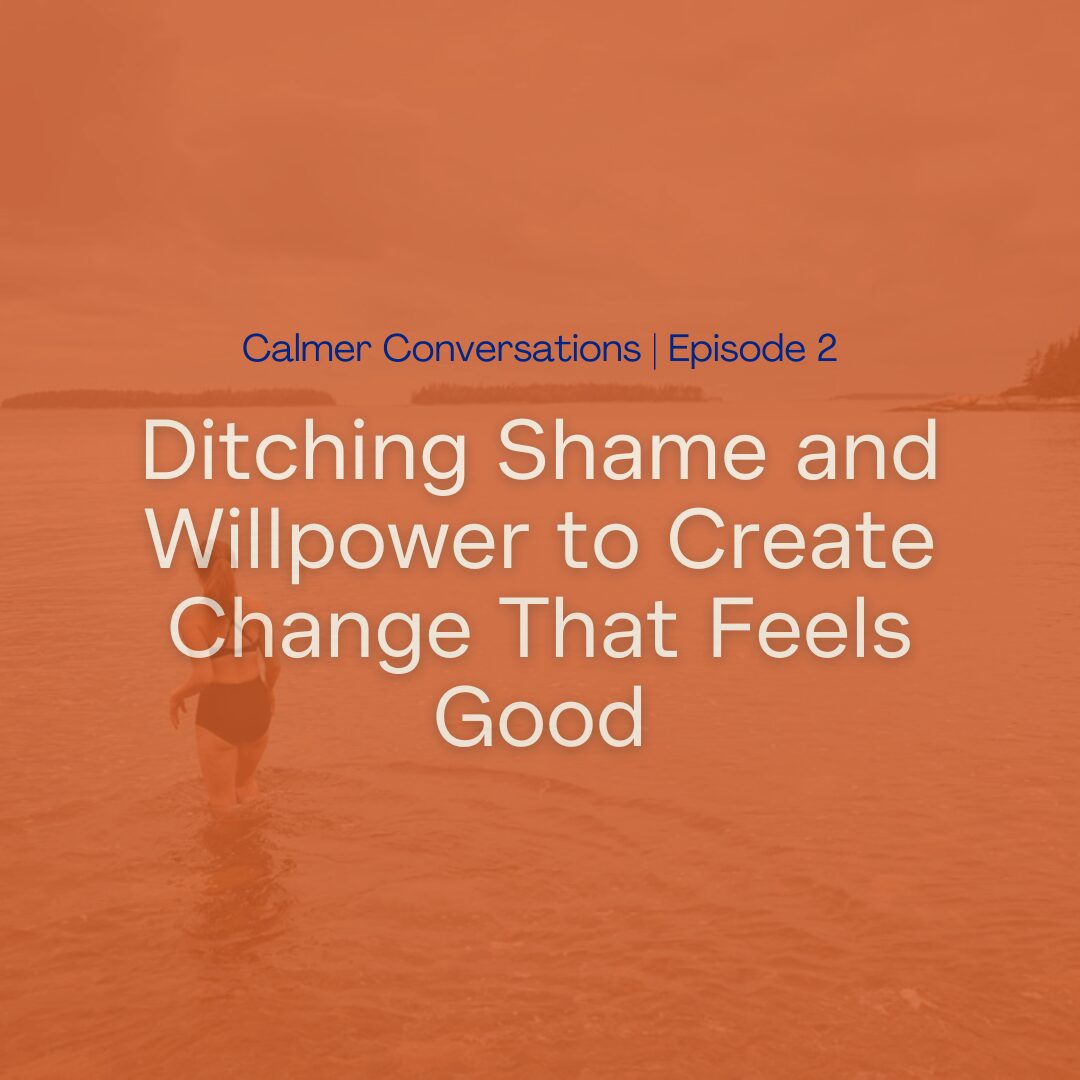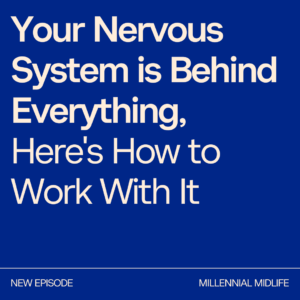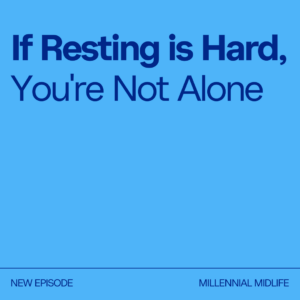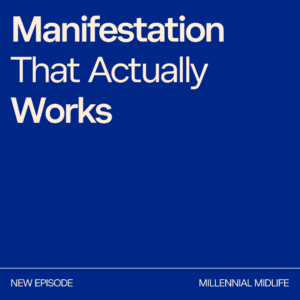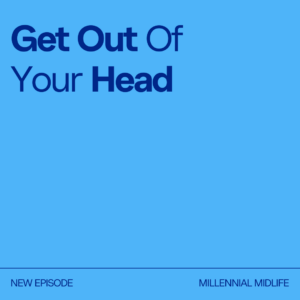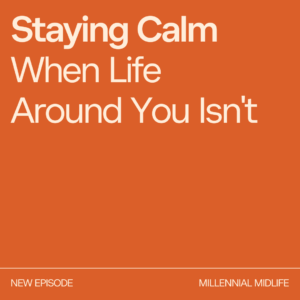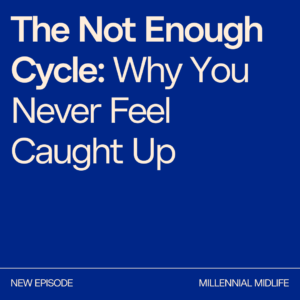Cecelia Baum Mandryk (00:02.798)
Hi and welcome to Calmer Conversations, episode number two, Getting It Together Without Shame or Self -Discipline. All right, so I work with people who are accustomed to being good at things. They’re accustomed to being successful. They’ve been good at school, they’ve gone to prestigious universities, they’ve accomplished a lot of things in their life. And a lot of times on paper, they look pretty successful either right now or previously in their life.
And yet when they come to me, it’s usually because they feel like they can’t get it together either in one or more than one area of their life. And whatever their normal methods have been to getting themselves there aren’t really working anymore. So I’m going to give you an example. So a client came to me, an author, and they sort of had a history of procrastinating, but they never missed a deadline. And so they would maybe wait until the last minute, but they’d always get things done.
But then at some point, it just really wasn’t working anymore. The forcing and the shaming and the being mean to themselves wasn’t working. And suddenly, they weren’t quite missing deadlines, but they were getting a lot closer than they ever had. And they had even asked for extensions a few times, which they were really uncomfortable with. Okay, so this person was using willpower, shame, they were using force with themselves, they were cajoling themselves, they were just generally being really mean.
This is where a lot of my clients are when they come to me. They’re trying to force themselves to do something, force themselves to make changes in their life. And they’re doing it by being mean to themselves, by really being rude to themselves. If, so, okay. And they’re doing this by being really mean to themselves. So not only is what they’re doing not working, but they’re adding insult to injury by telling themselves what a failure they are.
And they’re spending a lot of time in shame and guilt and feeling like a failure and feeling even maybe dejected or despondent about what’s happening in their life. And if you’re in this cycle, it can feel never ending. And so on paper, you might look like a success or your life might look really great. You don’t feel great in it. And you’re in this kind of continuous thing of why can’t I get it together? Feeling like a failure, making plans for how you’re going to be different. And then the whole thing repeating itself again
Cecelia Baum Mandryk (02:19.992)
Okay, so you might raise your hand or nod along or just say, me too, if currently you are being mean to yourself, if you consider yourself your own worst critic, if you never give yourself or rarely give yourself credit for what you do day to day, if you say things to yourself that you would never say to a loved one, a friend, or perhaps even an enemy. Okay, so if you did nod along, if you did raise your hand, if you said, yeah, me too, I’m gonna go ahead and add myself in there.
also there. I was my own worst critic and I was so mean to myself and really thought that this was the way to get better. This was the way to achieve my goals in life. So if this sounds familiar, you’re in the right place. And today we’re going to dismantle this myth. We’re going to break this down so that you can start to make changes in your life and also feel calmer while doing it without using force, without using willpower, without using self
After today’s episode, you’re gonna walk away with an understanding of what’s happening behind the scenes in your brain and get an idea of how to start working with your brain and nervous system so that you can stop yelling at your kids and your spouse, so that you can exercise regularly, so that you can stop frantically writing down every thought that runs through your head in fear of dropping a ball, so that you can be kind to you and enjoy your life. So you can stop procrastinating, right? Because no one is really enjoying life.
when they’re busy critiquing every single thing they do, when they’re busy telling themselves what a failure they are for not doing that one thing when they did 100 other amazing things that day. If you listen to episode number one, you know that your brain is a creature of habit. And so the first order of business today is to stop judging this behavior and to notice it as a habit that you’re in. And since it’s a habit that your brain adopted at some point in the past, it means that we can also change it now.
And for me and a lot of my clients, it’s pretty relieving to know that this is a habit, that it’s changeable instead of some character flaw that you have that you’re destined to live out forever and ever. So you might even just check in with yourself and say, when I think of it like a habit, instead of just like something that’s wrong with me, doesn’t that feel nice? Or what does that feel like in my body? Okay, so here’s the habit that your brain is in.
Cecelia Baum Mandryk (04:39.18)
Something happens, say you wanted to go for a walk when you got home from work or when you finished work and you didn’t go for the walk that you planned. So you tell yourself you’re a failure and you ask, why can’t I just get it together? What’s wrong with me? Your brain who’s been in this space before has so many answers for that question, what’s wrong with me? Why can’t I just get it together? And so it gives you all of those answers in that
It tells you maybe you’re lazy or you’re just not athletic or you never follow through on things or maybe you just don’t have enough time or your boss always brings things at the last minute. You’re bad at prioritizing things, whatever it is for you. And then maybe you spiral there for a while or you take that quick detour into distraction with food or shopping, social media, Netflix, whatever your flavor is. And then you add a little more shame on top for shaming yourself for doing those things and you make a new plan for tomorrow on how you’ll be a better person.
There are a couple habits in there. mean, first, just like if that sounds familiar to you, just say like, right, that’s exactly what I’m doing. Or I’m doing some version of that. And it’s personalized in this way. Right. So you might even pause the episode here, whether you’re walking or driving or you’re someplace like at your desk and think, what is the process that I’m in? Right. So if I think about when
when I do start beating myself up, what’s the cycle that I normally go through? If it’s different from what I just said, this is a really powerful place to start to bring your awareness to what’s happening in your brain and in your body and in your life. What is the thing that sets off something? What’s the story that’s going through your head? How does it feel? And what do you end up doing or not doing? And it’s okay if you can’t fill all those or answer all of those questions right now.
But even just taking a moment and considering it is really powerful because this is your specific habit, right? The list that I just gave, what I ran through is maybe somebody else’s habit, but you want to get familiar with what your habit is so you can work with your specific brain. So if you’re into implementing things, if you’re using this podcast as way to make changes in your life, pause and do that now. Okay.
Cecelia Baum Mandryk (06:47.64)
So if we’re looking at this generic person that I was just talking through, there are a couple habits in that cycle that I went through, right? The first is that when something doesn’t go to plan, you might blame yourself or someone else or something else, right? And in what we’re talking about today, we’ll get to blaming other people, but today we’re talking a lot about personal blame, right? So your brain thinks that a deep dive into failure is going to prevent whatever happened in the future.
that you need to get really familiar with what you did wrong and really kind of berating yourself for what went wrong and that that’s key to doing something different in the future. The second habit that your brain is in here is that your brain assumes that whatever happened is a personal failing. So that there is a character flaw or there’s something about you that has caused this to happen. So you have a fundamental flaw that you need to overcome in some way.
And we all assume that we’re the only ones dealing with this and promise I know running groups, the number of times where somebody mentioned something and other people are like, wait, that happens to you too, or I’m exactly in that same spot. So there’s this thing that your brain does where it thinks it’s just me, it’s just something I need to solve on my own, it’s my personal problem. The third habit that your brain is in there is that it thinks bringing up your failures will help you do something different next time.
And this goes a little bit into what I talked about with one about going the deep dive into failure is going to prevent it in the future. But noticing that you probably learned at some point, like we all have that beating yourself up is the way to change the future. So getting really clear on how awful you are on what a character flaw this is going into great detail about all of that is what’s going to help you from doing it in the future.
And then there’s the outcome that those mental habits have, which is feeling a certain way, right? Like maybe feeling ashamed, feeling like a failure, feeling generally bad about yourself. And then there’s the actions. So reacting to slash avoiding those emotions by perhaps going down the ice cream and Netflix rabbit hole or doing something else to help you feel differently in your life. Because often we really don’t like feeling ashamed and like a failure.
Cecelia Baum Mandryk (09:05.09)
We’d really prefer to feel some other way in our life. And so we do whatever we can to feel that way, right? So there’s that part of your brain, the motivational triad, conserving energy, avoiding pain and seeking out pleasure. When your brain feels something pain, like feeling shame or feeling like a failure, very often it’s natural reaction is to do something to create the opposite, to create pleasure. And we live in a world where
most of you, particularly if you’re listening to this, you have access to so many different pleasures, right? Social media alone, not to mention food, not to mention all the different streaming services that are available to you. And so noticing that this is just what I am. So again, if you went through that cycle that you, your personal cycle, your personal habits, you might pause this again and you might start asking yourself
Do I particular, what would I say to myself very specifically and what are the things that I do? What are the feelings that come up and what are the things that I do? Again, to get even more clarity. And you might have done that at first, but even just going back through and saying, can I get more granular? Can I understand this even more? So if you’re still listening to this, I’m guessing that not only is this familiar,
But whatever you’re doing isn’t working or just feels really bad in your life, right? You’re tired of beating yourself up to get things done. You’re tired of using willpower and self -discipline and force to get yourself to take action on things. You’d really rather be doing them from a different space. And so I also congratulate you on having that aha. And you should acknowledge yourself for even just saying this isn’t working.
And if you agree, if you think that what I’m doing right now isn’t working, you might even say out loud, this isn’t working. My approach right now for going for the walk, for exercising each day, isn’t working. When you say these things out loud, I’m not just asking you to be kind of silly, but it actually does something different in your brain. So you saying what I’m doing right now isn’t working will actually help you do something different in the future, right? So you might say that if you’re particularly in a place where you’re not around other people,
Cecelia Baum Mandryk (11:13.016)
Or you might just think it to yourself, but know that it is powerful to admit it. The shame isn’t going to magically solve your daily walk problem, right? It’s not gonna magically get you out the door if it hasn’t gotten you out the door before. And you might say, it has gotten me out the door for a while. Or using self -discipline and willpower has worked. And that’s true, right? mean, willpower worked for me for a long time. And I know it works for a lot of my clients, but at some point it stops working. And again, it probably just doesn’t feel very
Right? It kind of starts to perpetuate this loop in which you set a plan or a goal, you fall short, you feel bad about it, and then you repeat. And you say, I just need to have more willpower. I just need more self -discipline. I just need to make myself feel so bad that I’ll do it tomorrow. And then we have this commitment that tomorrow I’m gonna wake up, I’m gonna be a new person, and it’s gonna be all perfect, right? It feels like this route that you’re supposed, and…
This can feel like the route you’re supposed to take, right? You’re supposed to be mean to yourself. You’re supposed to be hard on yourself when you fail, right? Because if you’re not mean to yourself when you fail, what will keep you from failing in the future? You might even raise your hand if that’s what you think. I mean, that’s what a lot of us were taught. That’s what I was taught. And if you’re in this loop, if this sounds really familiar to you, there’s a good chance that you were taught this too. Maybe no one said it explicitly to you, but you saw it lived out. Like maybe you saw a parent
beating themselves up when they made a mistake, repeating something over and over again about how they should have done this and they shouldn’t have done this and they can’t believe they’re this lazy and they can’t believe they keep repeating this. You saw it modeled that when a mistake was made, you need to be mean to yourself. And then it also might have been implemented on you, right? You might’ve made a mistake and instead of somebody working with you and helping you understand the mistake, they might have shamed you, right? They might’ve said things that brought about shame within you and now you’re using the
languaging for yourself as you make a mistake. And this is again, just bringing it back to these are habits that have been formed in your brain that you’ve probably been living out for years, if not decades or more, right? So you were taught this way of handling mistakes, of handling failures, of handling when things don’t go to plan, when you don’t follow through on going for the walk, and you’re just living them out over and over
Cecelia Baum Mandryk (13:39.692)
So what we’re doing here again, we’re identifying the habit and then we’re going to start to shift how we think about it and then what we do, right? Because the thoughts are the key to changing what we do.
Again, we think that shame is gonna help us change something, but the real outcome of using shame is that instead of motivating you to do something differently, it’s actually making the thing you want to do feel even more dangerous. It’s training the part of your brain that doesn’t, that wants to avoid fear, that wants to keep you, or that wants to avoid danger, and that wants to keep you safe. It’s training that part of your brain to associate this activity with feeling bad.
And for your nervous system, feeling bad equals some level of danger. So something that it tries to avoid. And that means that even thinking about going for a walk can start to feel even, it can feel dangerous to your nervous system. It can bring in that fight, flight, freeze, fall on response so that you are even less likely to do it in the future. So instead of shame supporting you in making changes and being
being hard on yourself is actually perpetuating the cycle of not changing. This is so important, so I’m gonna say it again. Instead of supporting you in making changes, self -discipline and shame are actually perpetuating the cycle of not changing. They are keeping you stuck doing the same thing over and over again. And you might be saying, duh, I can see that in my life. Like I’ve been doing the same thing for the last 10 years. I know that it’s keeping me here.
But again, acknowledging, this is a mental habit. There’s a story here that’s keeping me stuck in this loop. And when I’m stuck in this loop, I keep seeing the same results in my life over and over again. That is not going for the walk and spending the evening sitting on your couch with a glass of wine and a show on the television. Okay, there’s nothing wrong with that. We’re going to acknowledge it. And again, how relieving is it to notice that this is just a cycle that you’re in?
Cecelia Baum Mandryk (15:42.176)
and that you can allow yourself to let go of it, to pick up a new habit. You can work with yourself to make changes instead of perpetuating the cycle of not changes, not making changes. Okay, so if you want to get out of this cycle, if you wanna change this, if shame isn’t the path to perfection, what is the alternative? Again, if you listen to episode one, you know that awareness is huge in the work that I do with folks.
Becoming aware of the cycle you’re in like you might have done earlier if you pause the episode and you took the time to look at one of the cycles that you’re in That’s huge. So now you know one of the cycles you’re in you’re aware of it, right? And then we want to accept it so you can take that cycle and say how normal that this is what’s happening to me how normal that I’m avoiding something and
once I get to the place where I know I’m about to meet a deadline, I start shaming myself and being mean to myself and that makes it even harder to get things done, right? So we’re awareness or we’re naming it, we’re noticing what’s happening, we’re naming it and we’re accepting it. And then really the keys here in moving forward and making changes are curiosity and compassion. So curiosity with yourself and having compassion for where you are or acceptance of the human nature.
the habit that your brain is in, right? Beating yourself up for having a habit is just like beating yourself up for doing anything else and it’s not gonna help you change the habit. So accepting the habit, which is not condoning it, which is gonna be another episode, the difference between accepting and condoning, you’re not accepting, you’re not condoning the habit, right? You’re not saying, I want to keep putting off going on this walk. I wanna keep my cycle of procrastination and doing things at the last minute and staying up all night to meet a deadline.
We’re not saying I condone this and I want it to continue, but what you are saying is this is the cycle that I’m in right now. This is what actually is happening in my life. I can name it. I can see it without judgment. I can even have some compassion for myself because I’m a human. And then I can start to get really curious, right? So I can start to ask myself if we’re going back to that walk, what are the stories that are leading to me not taking a
Cecelia Baum Mandryk (18:03.864)
What are the stories that helped me avoid working on something until the last minute? Why, from a place of curiosity, not judgment, do I think that I’m in this loop? Why do I think I’m there? And really take the time to answer it. And you might not be able to answer it right away. You might need to just keep this question open. But if you keep it open, again, with curiosity,
and not with judgment, right? So if you’re asking this from a judgmental place, like, why can’t you just get it together? You’re never gonna get the answer that’s gonna help you move forward, right? But if you start to ask the question with curiosity, your brain is amazing at answering questions. And when you start to ask, I wonder why I’m not going for that walk. I wonder what’s going on in my brain that’s preventing me from doing it. Your brain at some point will provide a really useful answer.
Right? And that might be something like, I think walks are boring, or I don’t think the walk is going to matter. I don’t think it’s going to improve my health, or I don’t think I have time to do this. Whatever it is, or walks are lonely, right? When I go for a walk by myself, it’s lonely. Noticing those stories again is so powerful. And that’s when we can start to change those stories, see what else you believe is true. So you can start to take different actions. But before you move to that place, right? Knowing that’s where you’re going.
really truly stay in the curiosity. Stay there as long as it takes for your brain to come back and tell you what it is. What’s the story that’s keeping you from doing a thing you want to do? What’s the story that’s keeping you in this loop? And again, this is why it is so powerful to work with a coach or with somebody else who can see your brain because the stories you tell yourself feel so true to you. And so your brain will keep, will sometimes have a hard time seeing
what’s happening, right? Because it’s you’re not practiced in this. This is a skill just like anything else. And so if it’s new to you and it feels weird, that’s okay. And again, think about if I did want to do this with somebody else, if I wanted to shortcut the circuit, if I wanted to make this happen quicker and more effectively, how would I do that? Right? Who would I work with? How could I help somebody see my brain so that I can make changes faster and I’m not stuck in this place?
Cecelia Baum Mandryk (20:20.076)
But know that you can do this on your own. It might take longer. It might not be as effective, but you can do it. But keep asking the question from curiosity. Keep asking yourself, why am I in this cycle? What are the thoughts that are leading me to take these actions that I don’t want to be taking or not doing the thing that I want to be doing? OK, so if you made it to the end, shaming yourself doesn’t work, right? That’s the main takeaway here. Being hard on yourself doesn’t work. And even self -discipline and willpower, while they are effective,
to some degree, actually they’re not that effective in the long run. They’re not, they can help you do something temporarily because you’re using fear and force and your brain wants to avoid fear and force. But at some point they stop being as effective because your brain kind of is onto you. And if you want to make real changes, you have to take a different approach, right? You have to go from a different angle. And again, if you’re listening to this, you know that intimately, you know that this doesn’t work long -term.
And in fact, the changes that you make using willpower often only last for certain period of time, and then you immediately revert to wherever you were before. And that’s because you haven’t taken the time to change those mental patterns, to become aware of them, to notice them, and then shift them. All right, so if you are somebody who is your toughest critic, who is really hard on themselves, I hope that this episode has helped you see why that maybe isn’t the path you want to be going down.
and why perhaps having a little more compassion for yourself and being a little kinder to yourself might be where you want to go in the future. Again, if you wanna do this work with somebody, make sure you check out the club. If you wanna do it with me, you can come get coached every week. We can start looking at your brain and we can start noticing what these patterns are. Otherwise, start to do this work on your own. Go through, do the exercises I suggested and see if you can start to become
scientist and looking at your own brain noticing your own thought patterns so you can shift and change them. All right, thanks for tuning in. I will see you next time.

